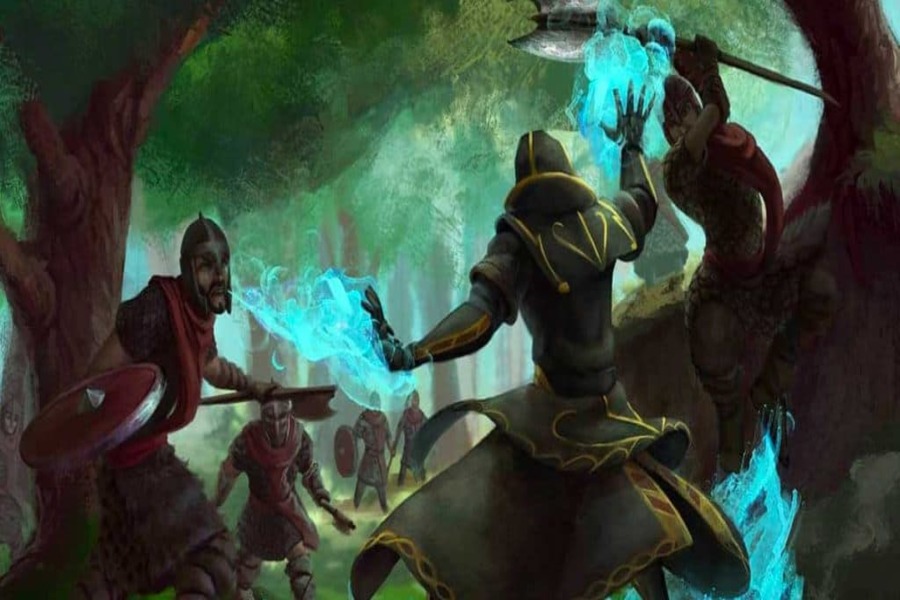“Don’t be afraid to use your fists if necessary, but if things get heated, don’t forget to cast Compelled Duel 5E.”
Welcome, brave Paladin, to your ultimate guide on mastering one of your most strategic spells: Compelled Duel. With this spell in your arsenal, you can command attention on the battlefield like no other.
This guide explains how Compelled Duel works, its advantages and limitations, and how to get the most out of it in combat. We’ll also explore role-playing opportunities with the spell and other abilities you should consider for your Paladin’s toolkit.
Whether you’re a veteran or just starting your Dungeons & Dragons journey, our advice will help improve your game strategy and understanding of this unique ability.
Let’s turn you into a true force to reckon with.’
Key Takeaways
- Compelled Duel is a bonus action spell in 5E that requires a Wisdom saving throw and has a concentration-based duration.
- The spell for battlefield control and to shield the party’s weaker members.
- When using Compelled Duel, timing, positioning, and managing concentration are key tactical considerations.
- The spell provides role-playing opportunities to showcase character qualities and backstory.
Related: Top 7 Best Classes For Eldarin In 5e
Compelled Duel 5E: Spell Overview

You’re about to enter the enthralling realm of Compelled Duel 5E, a powerful spell that is as engaging as it is effective. Let’s get started!
This spell opens up a remarkable dimension in your D&D game, allowing you to confront your adversaries directly and take command of their attention.
As part of the Paladin’s collection, Compelled Duel requires only one bonus action to cast. Its short casting time and Level 1 status make it an available choice for any aspiring Paladin.
This enchantment forces a creature you choose within range to fight you – and only you – making it an effective tactic when going up against formidable adversaries.
The primary aim here is not just inflicting damage but controlling the battlefield. An annoyed organization becomes significant in group confrontations; you protect weaker party members from harm by focusing an enemy’s attacks on yourself (the tank).
Take note, though – while incredibly helpful, this spell could be a lot better. Your opponent gets saving throws against the effect and can overlook it if they take damage from other sources or allies.
Next, let’s delve deeper into comprehending these details by exploring ‘spell mechanics: how does compelled duel work?’
Related: Does Identify Reveal Curses In DnD 5e?
Spell Mechanics: How Does Compelled Duel Work?
Ever pondered how this spell works in a game of D&D 5e? Here’s a quick overview to help you comprehend Compelled Duel:
- It is a bonus action. You can cast it and still have your standard action for attacking or other activities.
- With you, the target must pass a Wisdom saving throw or into the Duel.
- Its duration is concentration-based, up to one minute. If you lose focus, the spell ends.
- The range is relatively limited at 30 feet. If your opponent moves beyond that distance, the spell breaks.
- It only affects creatures that can understand your language. Good luck trying to compel a raging beast.
Remember, Compelled Duel isn’t just about forcing an enemy into one-on-one combat; it’s also about strategy and protecting your allies. Utilize their obsession with defeating you as leverage to control the battlefield.
Ready for more tactical advice? Let’s look into ‘the paladin’s Weapon: how to use compelled duel in Combat.’ It will open up new strategic options for you in-game.
The Paladin’s Weapon: How to Use Compelled Duel in Combat

Paladins can wield a powerful secret weapon in battle – using the compelled duel spell. This spell can force an enemy to focus solely on you, allowing your teammates to make their moves. But this tool requires careful strategy.
Timing is critical – don’t expend the spell on insignificant foes; save it for the big bands. Cast it at the start of combat or if your opponents are in a position to deal significant damage to your allies.
Positioning is also essential. You’re going to be taking fire, so make sure you have cover or are in a safe spot before casting. Use Compelled Duel with other spells and abilities for the most significant impact.
Managing concentration is essential since dropping it ends the spell. Have a plan to maintain concentration, such as using feats such as War Caster.
Ready to take this spell beyond combat? Our following discussion will explore role-playing with Compelled Duel: an array of narrative possibilities awaits!
Role-Playing with Compelled Duel: Narrative Opportunities
So, let’s jump into the fascinating world of role-playing with this particular Paladin spell and uncover its fascinating narrative potential!
Compelled Duel is more than just a combat tactic; it’s an opening to bring out your character’s qualities and backstory.
Envision your Paladin being an honorable knight who values fair fights. Using Compelled Duel, you can confront foes in one-on-one battles, exhibiting your character’s virtue and bravery.
Or your Paladin has a personal issue against a particular enemy type due to their backstory. When confronting such foes, the spell adds dimension to the clash and shows their stakes.
Bear in mind that compelled Duel isn’t just about drawing annoyance; it’s about improving storytelling by expressing exclusive characteristics of your character through gameplay mechanics. So, feel free to get imaginative and play around with how you use this spell during role-play scenarios!
Up next are hints on advanced tactics: optimizing compelled duel effectiveness. By understanding the narrative potential of compelled Duel 5e, you’re not only developing as a player but also enhancing the game experience for everyone at your table!
Advanced Strategy: Maximize Compelled Duel Effectiveness

Let’s look into how to maximize your capability when using this powerful paladin spell. One thing to remember is controlling the aggro in combat. You’re already a tough character, but when you cast Compelled Duel, you become the primary focus of the enemy. Implementing it at the right time can turn the tide of the fight.
We have a simple table that explains how to use Compelled Duel with other team members’ abilities:
| Party Member | Ability | Use With Compelled Duel |
|---|---|---|
| Wizard | Crowd Control Spells | To isolate and take down important enemies |
| Rogue | Sneak Attack | To grant rogue the opportunity for critical hits |
| Ranger | Ranged Attacks | To keep threats at a distance |
Next, consider backup plans when your spell disintegrates – keep in mind any harm done by your allies will end it. So communicate clearly! Also, analyze tactical environments; areas with narrow passages or choke points are great spots to use.
Regarding timing, start at the beginning of combat before enemies disperse or after an ally’s crowd control move. Before examining potential limits and solutions to compelled Duel, remember that information is power in Dungeons & Dragons.
Possible Limitations and Counters to Compelled Duel
Despite its undeniable strength, this powerful paladin spell does have potential drawbacks and counters worth considering in your strategic planning.
For example, creatures with abilities to resist or negate spells can easily counter Compelled Duel. Spellcasters with Counterspell available can instantly nullify your efforts. Additionally, creatures with high Wisdom saving throw capabilities may also present a challenge as they are more likely to resist the effects of Compelled Duel.
This spell could backfire in specific scenarios. Without preparation for one-on-one combat or without your allies positioned to take advantage of the situation, you could be isolated and overwhelmed.
Also, breaking line-of-sight with your target or attacking another enemy can prematurely end the spell. So focus on your chosen foe and keep track of your surroundings.
Being aware of these limitations and counters will help you use Compelled Duel more effectively in battle scenarios while minimizing risks.
Next, we will look into the Paladin’s toolkit: other spells synergizing with Compelled Duel for maximum battlefield control.
Related: Top 7 Best Damage Builds In DnD 5e
The Paladin’s Toolkit: Other Spells to Pair with Compelled Duel

Having examined the restrictions and responses to Compelled Duel, it’s evident this spell is a partial solution. It has its difficulties, but luckily, as a paladin, you’ve got a variety of other spells at your disposal. Let’s explore some spells that can combine with Compelled Duel to boost your combat prowess.
- Shield of Faith offers you a +2 bonus to AC for 10 minutes, giving you additional protection during one-on-one combat scenarios activated by Compelled Duel.
- This concentration spell requires maintaining focus. Concentration checks are required while using it.
- Use it when facing formidable opponents who can land strong hits.
- Bless grants up to three creatures of your choice within range an extra d4 for attack rolls or saving throws.
- Bless can help ensure that your attacks succeed and resist enemy control effects.
- Consider using this before starting the Duel for maximum effect.
- When you use Divine Smite, you can sacrifice a single spell slot to deliver additional radiant damage in addition to the damage done by your weapon.
- The Divine Smite damage increases with higher-level slots used.
- It’s ideal for delivering devastating blows once the Duel is in progress.
Rather than depending solely on Compelled Duel, mixing it with these spells from your toolkit can significantly boost your effectiveness in battle. Every encounter is unique; choose your strategy carefully depending on the conditions and the opponent’s strengths.
Conclusion
So, you’ve mastered the intricacies of Compelled Duel 5E. Like a warrior heading to war, you’re prepared to take command of the confrontation, drawing in your enemies and keeping your allies safe.
Keep it’s not only about winning—it’s about how you play the game. Utilize this spell carefully and make every move count. With planning, ability, and a bit of luck, you’ll become an unstoppable force at any D&D table.






